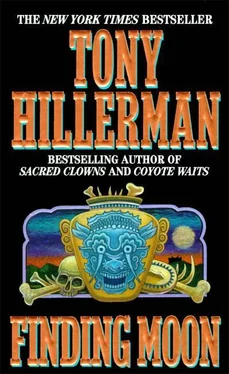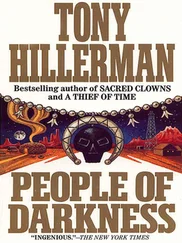Tony Hillerman - Finding Moon
Здесь есть возможность читать онлайн «Tony Hillerman - Finding Moon» весь текст электронной книги совершенно бесплатно (целиком полную версию без сокращений). В некоторых случаях можно слушать аудио, скачать через торрент в формате fb2 и присутствует краткое содержание. Жанр: Триллер, на английском языке. Описание произведения, (предисловие) а так же отзывы посетителей доступны на портале библиотеки ЛибКат.
- Название:Finding Moon
- Автор:
- Жанр:
- Год:неизвестен
- ISBN:нет данных
- Рейтинг книги:4 / 5. Голосов: 1
-
Избранное:Добавить в избранное
- Отзывы:
-
Ваша оценка:
- 80
- 1
- 2
- 3
- 4
- 5
Finding Moon: краткое содержание, описание и аннотация
Предлагаем к чтению аннотацию, описание, краткое содержание или предисловие (зависит от того, что написал сам автор книги «Finding Moon»). Если вы не нашли необходимую информацию о книге — напишите в комментариях, мы постараемся отыскать её.
Finding Moon — читать онлайн бесплатно полную книгу (весь текст) целиком
Ниже представлен текст книги, разбитый по страницам. Система сохранения места последней прочитанной страницы, позволяет с удобством читать онлайн бесплатно книгу «Finding Moon», без необходимости каждый раз заново искать на чём Вы остановились. Поставьте закладку, и сможете в любой момент перейти на страницу, на которой закончили чтение.
Интервал:
Закладка:
“He wants to see your pass,” the cabbie said.
Moon handed him the letter.
The guard examined it, stared at Moon again, returned the letter, and said something to the cabbie. All three laughed, and the older guard, still grinning, waved them through.
“Like I told you,” the cabbie said. “No trouble about the lady.”
Moon could see no sign that the inside of the Iwahig Prison and Penal Farm differed in any way from the outside. The potholed road still ran between rice paddies; hills rose a mile or two distant on either side of the road. The hills were covered by the deep green of the jungle, and at the margin of the jungle, bamboo shacks were scattered. Just ahead, two men were walking up the road, shovels over their shoulders. They stepped off into the grass, grinning, and made the universal hitchhiker’s signal.
“We’re inside the prison now?” Moon asked.
“Inside now,” the cabbie said. He laughed. “Don’t try to get away.” He slowed the jeepney to walking speed. The shovel bearers climbed onto the back.
“But who lives in the houses? Out beyond the rice paddies.”
“The colonists,” the cabbie said, gesturing toward his newly acquired passengers. “These guys.” He laughed. “They call ’ em colonists. After they’ve been here awhile, not done anything wrong for a while, they can bring their women in and build a house and get some land to raise their crop.”
“Really?” Moon said. He was remembering the cabbie laughing with the guards. Clearly this cabdriver liked his little jokes at the expense of tourists. The hitchhikers were actually prison employees, of course.
“And the prison keeps some buffaloes. So the prisoners can rent them when they need to plow. And then they turn in part of their rice, and the warden sells it and keeps part of the money to pay for the seed and the fertilizer and the rent.” The cabbie laughed again and held up his hand-rubbing his fingers together in all of suffering humanity’s symbol of extortion. “And a little something for the warden, I think. And a little something to buy Imelda a present too.”
“They used a system a lot like that in Java too,” Osa said. “When it was Dutch.” She turned and said something to one of the hitchhikers. The man grinned a gap-toothed laugh and produced a lengthy answer.
“He said you have to serve a fifth of your sentence before you can bring your wife,” Osa explained. “For him that was four years. And now he’s growing vegetables.”
“Not everybody wants to be a farmer, though,” the cabbie said. “Some of them work in the shop. Carve things. Make antique canes, chairs. Nets to fish with. Blowguns. Things to sell in the market.”
“What were you telling the guards back there at the gate?” Moon asked.
“I told them the lady was a lawyer the government sent down from Manila to investigate something. I told them you were her bodyguard.”
This time Moon laughed. “You’ll have trouble getting me to believe that story,” he said. “They looked at the letter.”
Now Osa chuckled. “I’ll bet they don’t read,” she said. “Is that right?”
“That right,” the cabbie said. “I had to tell them what it said. And I don’t read either.”
The man who came down the steps when the cab stopped at the administration building certainly could read. “I am Lieutenant Elte Creso,” he said, and took Moon’s letter. He glanced at it. “You are Malcolm Mathias,” he said, and looked at Osa. “It says nothing about a woman. Do you have a pass for the woman?”
“This is Mrs. van Winjgaarden,” Moon said. “My secretary. In Manila they said the letter would suffice for both of us. They said the authorities here would understand that one would be accompanied by one’s secretary.”
The lieutenant looked surprised. He considered this, looked at the letter again, sighed, shook his head, and motioned them up the steps.
The building reminded Moon of buildings he had seen in coastal Louisiana. It was a two-story concrete structure, whitewashed but stained by whatever those organisms are that grow on buildings in the tropics. It was raised some five feet off the earth on posts in tropical fashion and surrounded on both levels and all sides by broad verandas. Moon guessed it had been built early in the century, and not as part of a prison. Perhaps it was a hospital once, or a school. It dominated a broad, grassy plaza, the other three sides of which were lined by one-story buildings. They looked like barracks, Moon thought, but probably were quarters for the nonfarming inmates. He paused in the shade of the portal and looked back. Nothing stirred in the noonday heat.
It was very little cooler in the whitewashed room where they sat waiting for George Rice to be delivered to them. High ceiling, high windows, and a brass plaque beside the door declaring that Iwahig Prison was built in 1905 by the United States Philippine Commission. Overhead the blades of an ornate ceiling fan made their leisurely effort to stir the humid air. Even the lieutenant, wearing knee-length shorts and a short-sleeved shirt, was wilted. He was also a bit confused. His stare made his suspicious dislike of Moon apparent. But somehow Mrs. van Winjgaarden had charmed him.
“You know the rules,” he said, glowering at Moon and then smiling shyly at Osa. “Visits are limited to twenty minutes for colonists during the first month of their incarceration. Colonist Rice has not been here long enough to qualify for a longer visit. Nothing can be passed to the inmate. Nothing can be received from the inmate. The rules require that a guard will be present at all times.”
This recitation completed, the lieutenant gave Moon a final warning stare and backed out, bowed to Osa, and closed the door behind him.
They sat in straight-backed wooden chairs behind a long wooden table. And waited.
“Here we are, then,” Osa said. “I think this will be it. I think Mr. Rice will tell us what we have to know. I have prayed for that.”
Moon nodded. “Maybe so,” he said. And maybe this would be an appropriate time for prayer. He closed his eyes. Lord, he thought, let this Rice guy be the end of it. Let me just go home. Let this man tell us he doesn’t know where the kid is, and he doesn’t know how to get to this crazy preacher’s mission, and he doesn’t know a damned thing useful. He opened his eyes. Closed them again. Arid, Lord, let my mother be well again. And let her forgive me if I disappoint her again. Let her know it just wasn’t possible. That I really did- The door opened and a small man walked through it. George Rice. He wore a loose cotton blouse with broad horizontal stripes in black and white. And under the blouse, loose pants with the same stripes. Exactly like the costumes cartoonists put on convicts, Moon thought. But the man didn’t look like a convict even in that uniform. He had bright blue eyes, and a broad grin showed perfect white teeth. He had a well-trimmed white beard and mustache. Moon thought of Santa Claus.
A guard walked in behind him, even smaller. The guard looked about seventeen, and nervous.
“Well, howdy do!” George Rice said, beaming at Osa. “It is so good to see you agin, darlin’. So very, very good.”
The guard pointed to the chair on the other side of the table and said, “Sit, please.”
Rice sat.
“Mr. Rice,” Osa said, “this is Ricky’s brother. We hope you can give us some information.”
“Moon Mathias,” Rice said, extending a hand.
“I’ll be damned. You finally got here. Ricky thought you were the greatest thing since sliced bread.”
The guard stepped forward. “No touch,” he said.
His expression said he was embarrassed by this rudeness. He looked at Moon, his eyes asking forgiveness.
Читать дальшеИнтервал:
Закладка:
Похожие книги на «Finding Moon»
Представляем Вашему вниманию похожие книги на «Finding Moon» списком для выбора. Мы отобрали схожую по названию и смыслу литературу в надежде предоставить читателям больше вариантов отыскать новые, интересные, ещё непрочитанные произведения.
Обсуждение, отзывы о книге «Finding Moon» и просто собственные мнения читателей. Оставьте ваши комментарии, напишите, что Вы думаете о произведении, его смысле или главных героях. Укажите что конкретно понравилось, а что нет, и почему Вы так считаете.












